Honoring Iowans who stood against evil many Christmases ago
"We are giving our country and our loved ones at home a worthy Christmas present." -- Brig. Gen. Anthony McAuliffe, 101st Airborne Division

WATERLOO -- I was going to be grumpy about Christmas falling on a Monday this year.
I'll explain why later. I decided not to -- because of something I have under my Christmas tree.
My little tabletop tree is adorned with and surrounded by ornaments and mementos given to me by family and friends.
One of them is from a military veteran who attended our weekly Wednesday morning veteran coffees at the Sullivan Brothers Iowa Veterans Museum, part of the Grout Museum District where I work.
It is a laminated photo of soldiers of the U.S. Army's 101st Airborne Division attending Christmas Day Catholic Mass at Bastogne, Belgium on Dec. 25, 1944, during the Battle of the Bulge in World War II.
As the soldiers in that photo celebrated that Mass, they were surrounded by Nazi troops, in the ninth day of a siege that followed a furious German offensive. Many Allied units were overrun in the bloodiest battle of the war for U.S. forces. More than 81,000 Americans were killed, wounded or missing in the fighting, in brutal winter conditions.
One of our vets coffee regulars at the museum had secured and circulated copies of the photo from a soldier from Missouri who had served in the 101st at Bastogne.
I thought of the many Bulge veterans I had interviewed over the years as a reporter for the Waterloo-Cedar Falls Courier. Among them:
G.A. "Bud" Lauer, a Waterloo trucking contractor, was part of a 105mm howitzer crew with the 101st at Bastogne. He recalled sleeping outside in the cold and snow for weeks at a time and under constant enemy shelling.
"You learned to survive, or die," he said. On Christmas Eve, he was injured by the recoil of his own howitzer but passed up going to hospital inside the city for treatment. The Germans bombed and destroyed the hospital that evening, killing everyone inside.
He brought home an accordion he acquired from Hitler’s Eagle’s Nest at Bertchesgaden, captured by the 101st at war’s end. He said his favorite song was “Lili Marleen” by anti-Nazi German-born actress Marlene Dietrich. He heard it a lot at Bastogne. The Germans played it and Christmas carols over loudspeakers.
He passed away in 2014 at age 91.
Otto Lewis Boeck of Janesville north of Cedar Falls, the grandson of German immigrants, went by "Lew' instead of the German sounding "Otto." He served in a communications platoon with the 99th Division of the U.S. First Army in the siege at Elsenborn Ridge during the Bulge.
His job was to lay and maintain communication wire between command posts and rifle companies --- which frequently left him exposed to enemy fire. Two thirds of the soldiers in the 99th were killed or wounded, but they held and helped break up the German offensive.
His German heritage came in handy near the war’s end, as he was able to fenagle a sit-down dinner for he and his comrades, courtesy of a German family — whose daughters had been abused by Nazi SS forces.
He passed away in 2020, two days after his 95th birthday.
Naaman "Jock" Hickey, Jr. of Waterloo, the grandson of a once-enslaved railroad worker from Mississippi, served in a mobile bakery unit. He was on night guard duty and spotted what he thought was gunsmoke in the twilight. It was the parachutes of attacking German soldiers. He was quickly pinned down by enemy fire as he tried in vain to reach a machine gun emplacement. He managed to survive the battle. He died in 2014 just short of his 90th birthday.
Ralph Kephardt of Hazleton and comrades in Company E, 17th Armored Engineering Battalion, U.S. 2nd Armored Division were ready to sit down to a rare treat for soldiers in the field. They were the guests of a Dutch family for Christmas dinner.
The dinner was canceled when they were ordered to move 100 miles south, slogging through the muddy snow to help blunt the German offensive.
His unit installed pontoon bridges, often under enemy fire, for advancing tanks and troops. He would help them ford the Rhine River into the heart of Germany that following March. He died in 2022 at age 101.
David Sandvold, the longtime president of Simpson Furniture Co. in Cedar Falls, commanded an armored halftrack in the 11th Armored Division of Gen. George S. Patton's U.S. Third Army. Known by the nickname "Sandy" in service, he and his comrades pulled out of a winter battle in Germany and swung 104 miles north to relieve soldiers of the 101st at Bastogne.
"You don't bleed when it's that cold," he said, recalling administering morphine to wounded comrades. He said Patton told his troops, "Go as far as you can as fast as you can with as much as you can."
That May, his division would liberate the Nazi concentration camp at Mauthausen. He and his halftrack crew personally wiped out a Nazi gun crew who machine gunned to death scores of emaciated prisoners running from the camp toward their American liberators.
About a year before his death in 1996, he said he thanked God "for the opportunity to wipe that scourge off the face of the earth."
Elmore Herold of Waterloo, a longtime Rath Packing Co employee and volunteer at St. Vincent de Paul in Waterloo, was an anti-aircraft gunner in the Third Army, at one point guarding Patton's headquarters. After participating in the Bulge he was severely wounded but returned to his unit in time to help liberate the concentration camp at Buchenwald. He would not discuss in detail what he saw there to his dying day.
But he tearfully recalled how his dad kept a promise and did not shave until Elmore returned home from the war. His father sported a full beard at Elmore’s homecoming. Elmore died in September 2022, a few weeks short of his 100th birthday,.
The soldiers of 101st who assembled for Christmas Day Mass at Bastogne may have had one of their prayers answered a day later, when Patton's forces broke through and relieved them. The tide had turned, but the battle would continue through the end of January,
The day Patton's forces broke through to Bastogne, another soldier from Waterloo landed at Le Havre, France. He'd guarded German prisoners as a military policeman in Kansas and volunteered to go overseas. Drafted at age 35 and married with an infant son, he would serve with the 202 Station Hospital in Luxembourg, Holland, Belgium and Germany, hauling wounded from the front on a hospital train from Feb. 15, 1945 to the end of the war.
"Some of these boys are so crippled up I don't think they'll ever be the same again," he wrote his wife, working back in Waterloo at a defense plant.
That soldier was my dad, Pvt. George J. Kinney II.
That letter is in my mom's cedar chest.
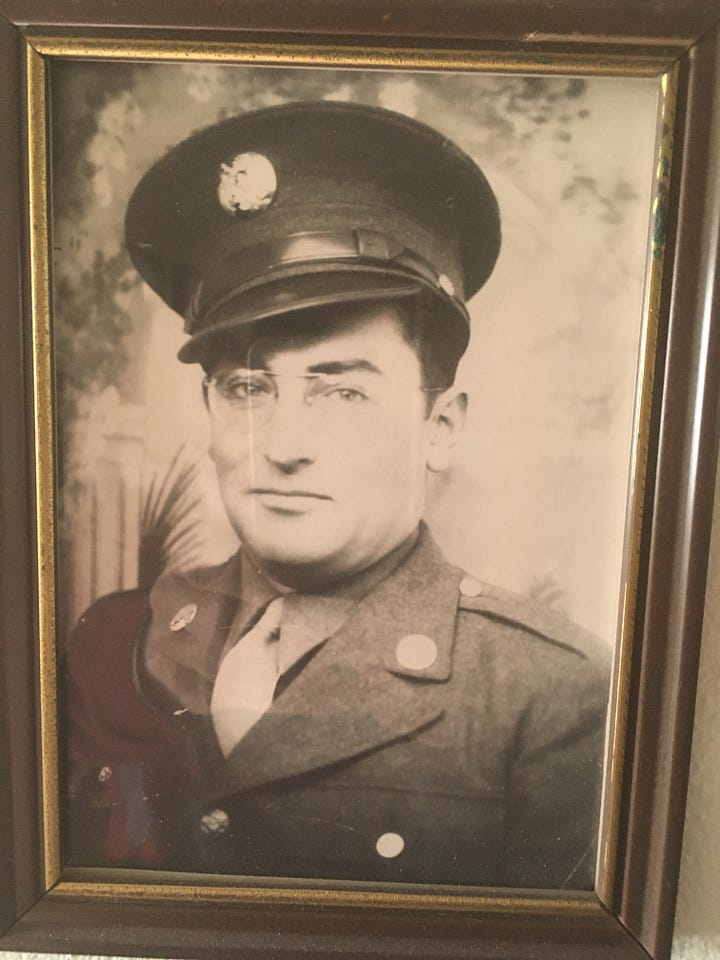
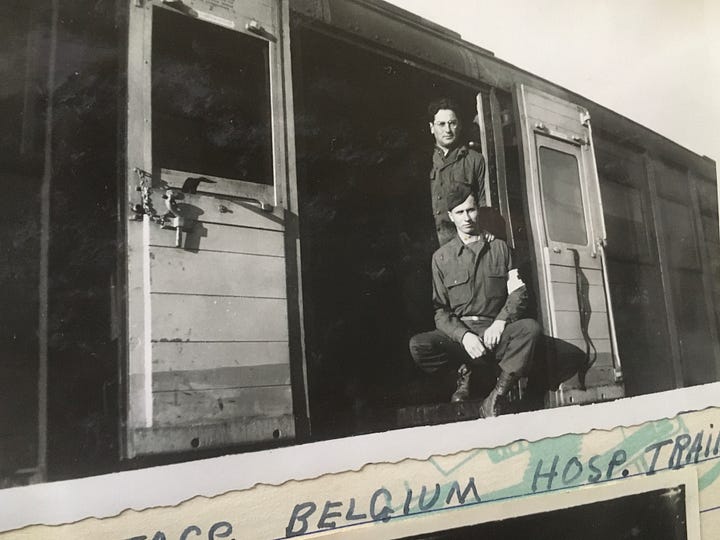
Those guys are all gone now. My dad died in 1990.
So, this past weekend I initially chafed a bit when the pastor at church told us that all practicing Catholics in good standing are required to attend Mass twice on Christmas weekend -- once for Christmas as a holyday of obligation, and once to fulfill the requirement for Mass attendance every Sunday. It's the same any time Christmas falls on a Saturday or a Monday. That's, of course, under pain of mortal sin and eternal damnation, but they like to soft pedal that nowadays.
It seems a bit of an imposition, particularly to young families with little kids, to coax and pry the little ones away from the excitement of Christmas and get them ready to attend Mass on time twice in a weekend.
I tamped down my rebellious indignation at mother Church, however, when I considered the picture under my tree of the soldiers of the 101st at Mass at Bastogne.
That Christmas Day in 1944 also fell on a Monday.
Those guys went through a heckuva lot more than I ever have or will to get to Mass that day. They braved not only the elements, but the bullets and brutality some of the worst tyranny in human history.
No matter your faith tradition, if any, it was an affirmation of hope in a very, very dark time -- not only for those soldiers for hope of their own survival, but for something bigger than themselves. For humanity. For freedom.
So, this weekend, yes, I'll go to Mass twice. But not just to punch my ticket, "stay legal," comply with a rubric of the church and fan away perdition’s flames.
I'll do it for Bud, Lew, Jock, Ralph, Sandy and Elmore. And all those guys at Mass at Bastogne in that photo and other men and women whose names I'll never know.
And for Dad.
They gave a big chunk of their youth for all of our todays and tomorrows. And for liberty.
Pat Kinney is a freelance writer and former longtime news staffer with the Waterloo-Cedar Falls Courier and, prior to that, several years at the Ames Tribune. He is currently an oral historian with the Grout Museum District in Waterloo. His “View from the Cedar Valley” column is part of “Iowa Writers Collaborative,” a collection of news and opinion writers from around the state who previously and currently work with a host of Iowa newspapers, news organizations and other publications. Click on their links below to sample their work.
The Iowa Writers’ Collaborative




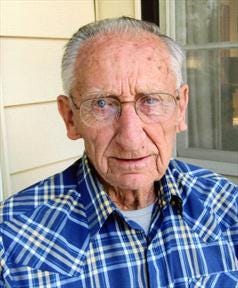
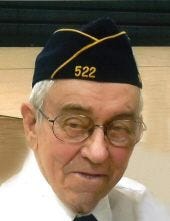

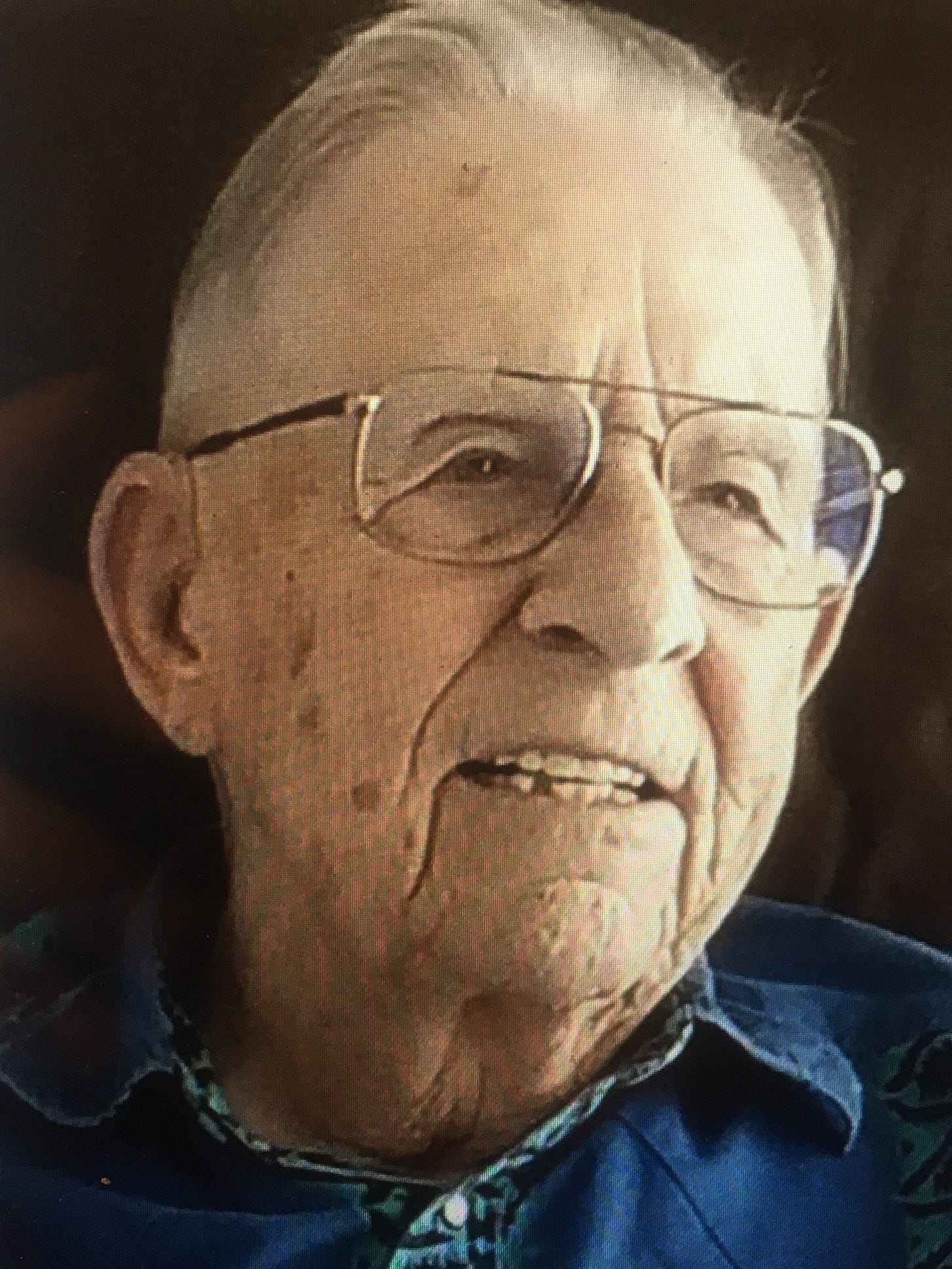
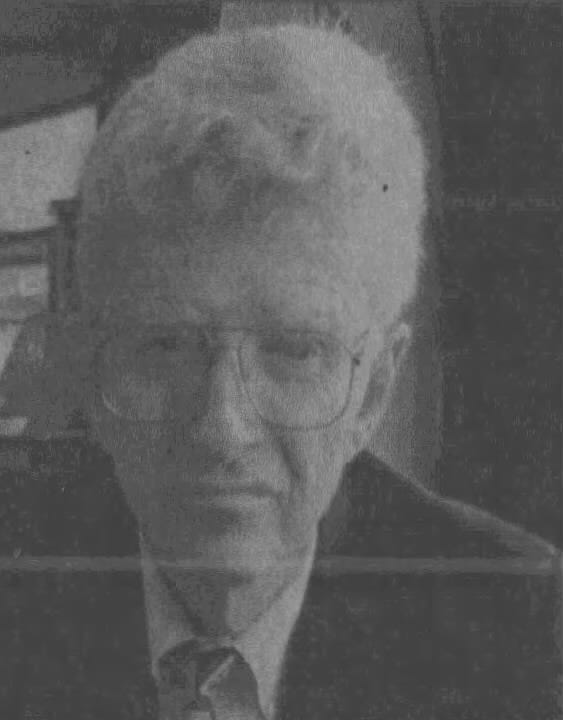

Pat, thanks for giving us a sense of perspective. My dad also spent Christmas 1944 on the front lines in France. Not at Bastogne, but in a foxhole with a rifle in his hand. He came home never wanting to fight, or even so much as argue, ever again. The stuff that bothered other people rarely bothered him. He’d seen so much worse.
Another great article Pat. So many hero’s.